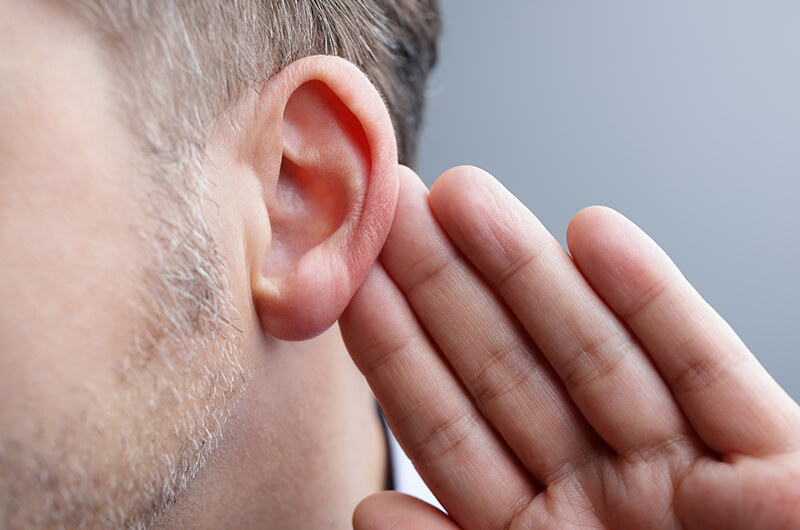Hearing Loss Overview
Hearing loss is a condition in which the person's hearing capacity is impaired enough to prohibit them from living the life they wish to lead. Hearing loss affects 15 percent of adults in the United States. This figure increases the older you get, with 25 percent of people aged 65-75 reporting a hearing loss.

Types of Hearing Loss
There are two primary forms of hearing loss, sensorineural and conductive.
Sensorineural hearing loss is the most common form of hearing loss among adults. This is caused by a progressive degradation in the inner ear of the delicate hair cells. These cells are instrumental in producing sounds processed by the brain, and sound becomes distorted when they are damaged. That makes hearing conversations very difficult, particularly in public places such as restaurants and cafes. It is typically caused over a long period by prolonged exposure to loud noises. Sensorineural hearing loss is permanent, and because the damaged hearing can not be recovered, hearing aids are the most commonly used and effective treatment.
Conductive hearing loss is considered the less prevalent form of hearing loss. This kind happens most often in young children when the inner ear is blocked, preventing sound from entering the inner ear. General causes of conductive hearing loss include an ear infection or fluid build-up. Conductive hearing loss care typically revolves around surgery to address the root cause of the hearing loss.
Tinnitus & Hearing Loss
Another form of difficulty with listening is tinnitus. This is the experience of hearing sound, even though there is no external stimulus. After an incredibly noisy show, concertgoers may get ringing in the ears. This form of tinnitus is temporary.
Others might hear the sound of whooshing, hissing, or whizzing. At the same time, it can vary in volume and pitch throughout the day. Some sufferers find their tinnitus most apparent at night or in quiet areas. There is no remedy for tinnitus, but there are numerous ways to control the symptoms. Tinnitus appears in a high number of hearing loss cases, which is why hearing aids often come equipped with tinnitus therapies.

The Benefits of Treating Hearing Loss
According to the American Speech-Language-Hearing Society, hearing loss is the third most common chronic disease in the USA. Yet people don't take it seriously enough. Usually, people wait about seven years before choosing to act on their hearing loss. That explains why hearing aids are currently used only by a small percentage of those who need them.
Many people may postpone their care because they're afraid to act, but delaying treatment could lead to more issues down the road. In fact, many different studies have also shown that taking steps to treat hearing has many advantages:
Increased Earning Power
The latest research has found that if you don't manage your hearing loss, you could decrease your earnings by $30,000 a year. But if you manage your hearing loss, these reduced earnings may be mitigated by up to 90%. The study conducted by the Better Hearing Center showed that the earnings decline was most acute for those with more severe hearing loss.
Improved Cognition
Our minds, no matter what we do, will not remain in great shape throughout our lives. But to reverse the decline, there are some things that you can do. The use of hearing aids has been linked with a decrease in the risk of developing dementia. The study from academics based at Manchester University in the UK found that hearing aids delayed cognitive impairment participants by an average of 75%.
Treatment for Tinnitus
Nowadays, many hearing aids come complete with a tinnitus therapy system. Typically this consists of a bank of sounds set at different frequencies to mask your tinnitus tone. With these and other aids, tinnitus sufferers reported handling their tinnitus in a much more productive way.
Strengthened Connections With Loved Ones
People with hearing loss may have noted the burden it causes on their relationships with family members and associates. This is understandable because all social interactions are based on communication. Individuals with hearing loss can reconnect to their most important relationships by improving their hearing. Treating hearing loss also contributes to one’s quality of life, emotional well-being, and self-confidence, and can reduce social alienation and depression.
If you're ready to take charge of your hearing health, contact us today!
Have Questions?
Whether you’re deciding which hearing aid model is best for you or you want to learn more about the benefits of hearing treatment, we’re here to help!
